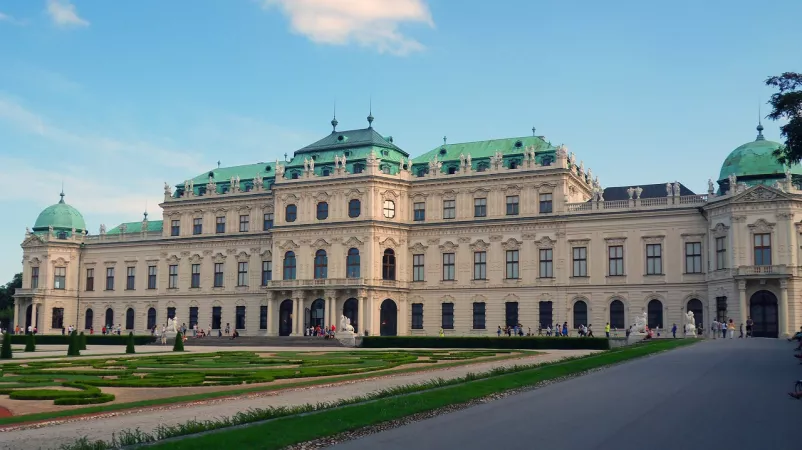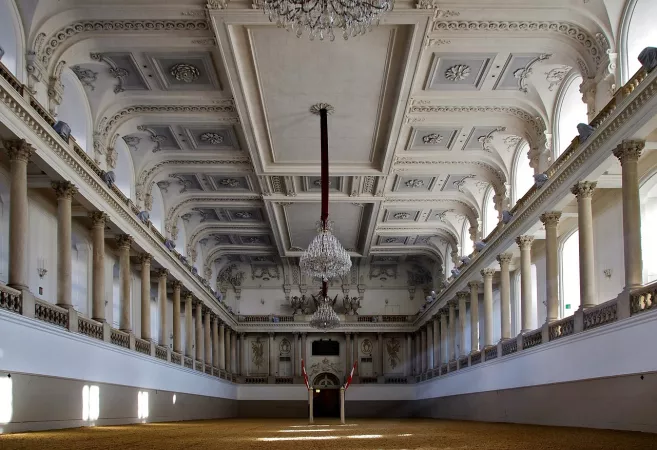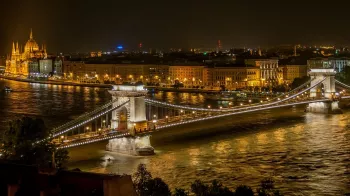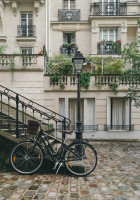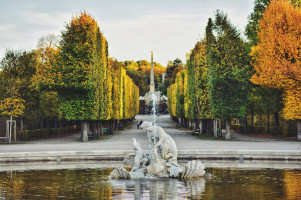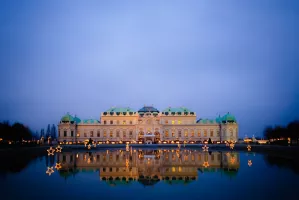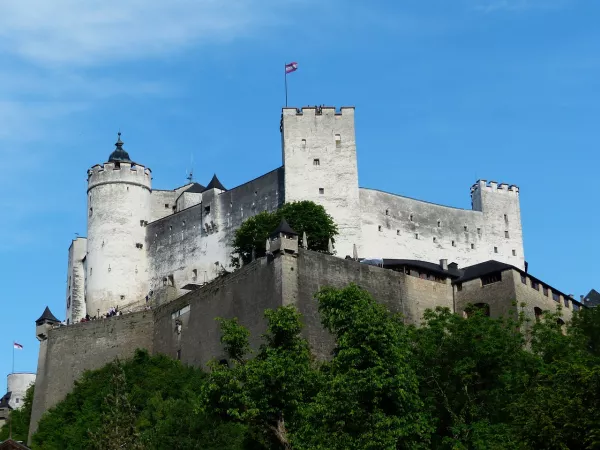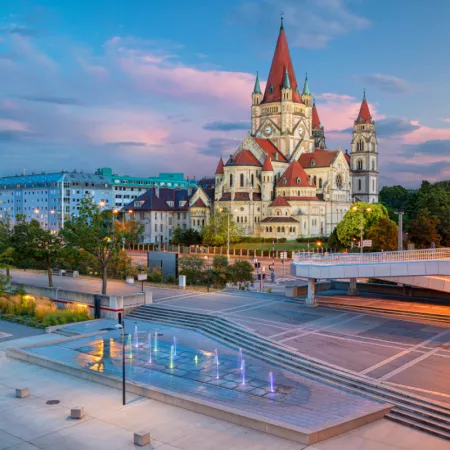
Vienna Travel Guide
Vienna, the capital of Austria, is a city rich in history, culture, and architectural beauty. Known for its classical music, coffee houses, and imperial palaces, Vienna has been a center of art and culture for centuries. The city's stunning architecture, including the Schönbrunn Palace and St. Stephen's Cathedral, reflects its imperial past. With a vibrant arts scene, bustling markets, and delicious cuisine, Vienna offers a blend of old-world charm and modern sophistication.Top Attractions in Vienna
- Belvedere Palace
- Hofburg Palace
- Vienna State Opera
- Prater Park and Giant Ferris Wheel
- Albertina Museum
Vienna is Famous for
Known for its classical music heritage, Vienna is famous for being the birthplace of Mozart, Beethoven, and Strauss.Top Attractions in Vienna
- Exploring the historic Schoenbrunn Palace
- Taking a stroll through the picturesque Stadtpark
- Indulging in Viennese coffee culture at a traditional coffeehouse
- Visiting the Kunsthistorisches Museum for art enthusiasts
- Enjoying a performance at the Vienna State Opera
What's Great about Travelling to Vienna?
- Rich cultural heritage
- Beautiful architecture
- World-class museums and art galleries
- Diverse culinary scene
What's Not So Great about Travelling to Vienna?
- High cost of living
- Crowds of tourists in peak season
- Language barrier for non-German speakers
- Limited public transportation options
Travel Tips for Vienna
- Check visa requirements before traveling
- Use public transportation or rent a bike to explore the city
- Be cautious of pickpockets in crowded tourist areas
- Try traditional Viennese dishes like Wiener Schnitzel and Sachertorte
Important Vienna trip information
- Ideal Duration: A week to fully explore the city and its attractions.
- Best Time to Visit: Spring and fall for pleasant weather and fewer crowds.
- Nearby Airports and Railway Stations: Vienna International Airport, Wien Hauptbahnhof (main railway station).
Top 32 Places to visit in Vienna
Total
3,31,500
*EXCLUDING APPLICABLE TAXES 5.0 Ratings
( 24 Reviews )
( 24 Reviews )
Total
2,56,000
*EXCLUDING APPLICABLE TAXES 5.0 Ratings
( 24 Reviews )
( 24 Reviews )
Total
4,76,500
*EXCLUDING APPLICABLE TAXES 5.0 Ratings
( 24 Reviews )
( 24 Reviews )
Per Person
2,18,642
*EXCLUDING APPLICABLE TAXES 5.0 Ratings
( 393 Reviews )
( 393 Reviews )
Per Person
1,62,328
*EXCLUDING APPLICABLE TAXES 5.0 Ratings
( 393 Reviews )
( 393 Reviews )
Per Person
1,18,000
*EXCLUDING APPLICABLE TAXES FAQ's on Vienna
Q1: What is the best time to visit Vienna?
Vienna is beautiful year-round, but the best time to visit is during the spring (April to May) and fall (September to October) when the weather is mild, and the city hosts various cultural events and festivals. Summer (June to August) is also popular despite being busier with tourists. Winter (December to February) is magical with Christmas markets, but it can be cold. Consider your preferences for weather and activities when planning your trip to .
Q2: Do I need a visa to travel to Vienna?
As part of the Schengen Area, most tourists from countries like the US, Canada, Australia, and many others can enter Austria, including Vienna, visa-free for up to 90 days within a 180-day period. Check the specific requirements based on your nationality to ensure compliance with the visa regulations for .
Q3: What are the must-visit attractions in Vienna?
Vienna is known for its stunning architecture, rich history, and cultural heritage. Don't miss attractions like Schönbrunn Palace, St. Stephen's Cathedral, Belvedere Palace, Hofburg Palace, and the Vienna State Opera. Explore the museums, enjoy a concert, and stroll through the historic city center to truly experience the beauty of .
Q4: Is Vienna a safe place to travel?
Vienna is generally considered a safe destination for travelers. However, like any major city, be cautious of pickpocketing in crowded areas and avoid poorly lit or deserted areas at night. Stay alert and follow common sense safety practices to ensure a smooth and enjoyable trip to .
Q5: What is the local currency in Vienna and can I use credit cards?
The official currency in Vienna is the Euro (EUR). Credit cards are widely accepted in hotels, restaurants, and shops. ATMs are also readily available throughout the city for easy access to cash. Notify your bank of your travel plans to avoid any issues with card usage in .
Q6: What is the local cuisine like in Vienna?
Viennese cuisine is a delightful mix of traditional Austrian dishes such as Wiener Schnitzel, Sachertorte (chocolate cake), Apfelstrudel (apple strudel), and hearty stews. Explore the local markets and coffeehouses for a taste of authentic Viennese flavors. Vegetarian and international options are also widely available in .
Q7: What transportation options are available in Vienna?
Vienna boasts an efficient public transportation system, including trams, buses, and an underground metro (U-Bahn). Taxis and ride-sharing services are also convenient for getting around the city. Consider purchasing a Vienna Card for unlimited public transport and discounts on attractions for a hassle-free travel experience in .
Q8: Are there any cultural norms or etiquette I should be aware of when visiting Vienna?
When visiting Vienna, respect local customs such as greeting with a handshake, addressing people by their titles, and maintaining punctuality. Remember to be polite, avoid discussing sensitive topics like politics, and follow dress codes when visiting religious sites. Embrace the city's rich cultural heritage and enjoy your stay in .
Q9: I am a travel agent. How can I buy travel leads of Vienna?
Register yourself as a travel agent at agents.tripclap.com and then you can buy travel leads to Vienna once your account is approved. For more details contact our support team at +91-8069186564 or support@tripclap.com
